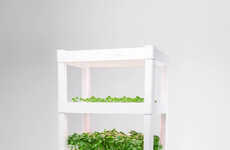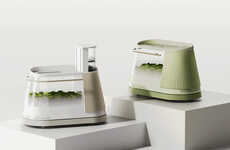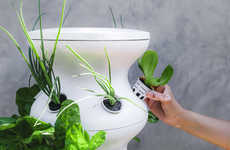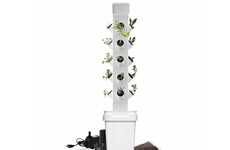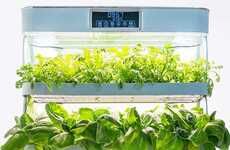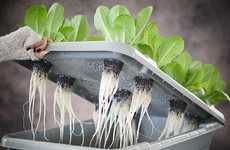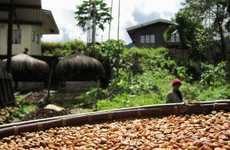
Dawai House's 'Compact Hydroponics Container' is Condensed
References: daiwahouse.co.jp & gizmodo
The Japan-based home building company Daiwa House has released its 'Compact Hydroponics Container' technology to the public. The small cube is meant to act like a miniature farm, and is being deliberately sold to restaurants, hospitals and hospitality hubs.
The excessive amount of crops that can be produced by way of the Compact Hydroponics Container are ill-suited for the needs of small or even large families. Its promised output of 10,000 bushels of lettuce per year would only be appropriate for members of the food industry.
While it is true that the Compact Hydroponics Container is air-conditioned, solar powered and self-fertilized, its biggest selling point is its size. It can be stored in a small parking space if need be, making it an economical and easy to store business purchase.
The excessive amount of crops that can be produced by way of the Compact Hydroponics Container are ill-suited for the needs of small or even large families. Its promised output of 10,000 bushels of lettuce per year would only be appropriate for members of the food industry.
While it is true that the Compact Hydroponics Container is air-conditioned, solar powered and self-fertilized, its biggest selling point is its size. It can be stored in a small parking space if need be, making it an economical and easy to store business purchase.
Trend Themes
1. Compact Hydroponics Container - The innovative technology of the Compact Hydroponics Container offers a disruptive opportunity for farming by enabling highly efficient and space-saving cultivation.
2. Miniature Farming - The trend of miniature farming presents a disruptive innovation opportunity for restaurants, hospitals, and hospitality hubs to cultivate their own fresh produce onsite, reducing transportation costs and increasing sustainability.
3. Economical and Easy to Store Business Purchase - The trend of compact and easily stored farming solutions like the Compact Hydroponics Container provides business professionals with a disruptive opportunity to incorporate on-site farming within limited spaces, enhancing self-sufficiency and reducing reliance on external suppliers.
Industry Implications
1. Food Industry - The food industry can leverage the Compact Hydroponics Container to efficiently produce large quantities of crops, reducing dependence on external suppliers.
2. Restaurant Industry - Restaurants can adopt the Compact Hydroponics Container to grow their own fresh ingredients, ensuring a steady supply of high-quality produce and reducing food transportation costs.
3. Hospitality Industry - The Compact Hydroponics Container offers the hospitality industry an innovative solution for growing fresh produce on-site, enhancing the overall guest experience with farm-to-table concepts and sustainability.
4
Score
Popularity
Activity
Freshness


